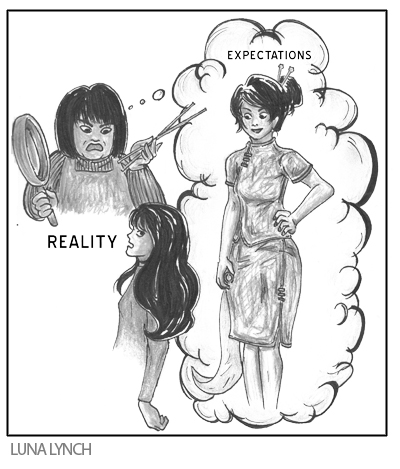
A first generation American is the child of immigrant Americans, or in other words, the first in a family’s generation to be born in the United States.
As a first-generation American, things often are rough-especially when a family is starting a new life in the states.
“When you’re young [you] don’t really understand it, but you have this feeling of having to start all over with your life,” says junior Greg Portnov, whose family moved to the United States from Moscow. “That can be difficult to get through, and it was really difficult for my mother and father. But after you get through that after the first couple of years you realize that what you’ve really made up for what you’ve missed.”
Junior Elian Boukhail shares some similar sentiments as Portnov in that being a first generation can be a hardship.
“It’s hard to adjust to the different lifestyle,” says Bouhkail, whose parents emigrated from Lebanon. “I get disciplined differently. I get different lectures than the usual American would. So my problems are different from normal Americans.”
Bouhkail also feels as though being immersed in two different cultures have altered what her usual priorities would be.
“I worry about grades and family rather than hanging-out with friends. Usually when a friend complains to me it’s because their mom didn’t let them go out. The things that I complain about are about family being sick. Family is first.”
Boukhail also encounters different opinions from her parents.
“Unlike my parents, I am very open to different cultures and ideas and religions,” says Boukhail. “I am open to new things more than my parents are because they have been raised around hate their whole lives. They were raised in a war. They were raised to hate, and I grew to appreciate.”
Portnov also has learned to be more accepting and tolerant due to his foreign heritage. “I don’t judge people as much because I’ve been there. It helps you learn about human nature. It helped me accept people more because I know what it’s like to be an immigrant, and I know what it’s like to be of high-class. I understand difficult kinds of situations,” says Portnov.
Junior Alice Zheng, whose parents both emigrated to the U.S. from China, says that it can be difficult being a first-generation American due to the different culture between her parents and that of American’s.
“My mother tells me to pull up my shirt all the time,” she says. “Also, she didn’t know that you can have a social life in high-school; she thinks that I have to study all the time. So, whenever I try to hang out with friends, she’s like ‘what are you doing?’”
Sophomore Rachel Van Heteren also shares parental woes.
“My dad is from Canada,” cries Van Heteren. “He pronounces ‘drama’ ‘draaa-ma,’ and that causes a lot of drama.”
Also, Van Heteren is not allowed to complain about the weather due to her father’s Canadian heritage.
“[My father] always tells me stories about living in Calgary, and how they had to turn off the water so the pipes don’t burst because of the ice! That means that I cannot complain about the weather because they had terrible weather there. And whenever I go to Canada, they talk about being Canadian, and they know so much about America and they always talk about our politics.”
However, after parents have stayed in America for a while, they develop a better understanding of American culture, and thus are more relaxed towards western ideas.
Zheng says that her mom “got used to [hanging out with friends, etc.]”
Despite language barriers, parental-woes, and cultural differences, Portnov feels as though the living in the United States has vastly improved his life.
Portnov says, “There are so many more opportunities here than in my country, and there is a much stronger feeling of community and friendship here. There’s more to do here. I’m glad that I came over here.”





